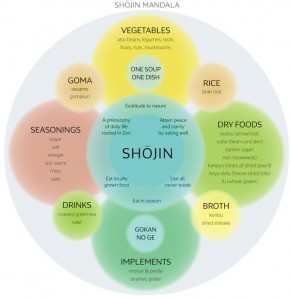
The word “shojin” consists of two characters—sho 精, to “purify,” and jin 進, the word for “advance.” In other words, “purifying the heart with real food enables us to move toward peace and clarity.” Ryori 料理 commonly is translated as “cooking,” but on a deeper and broader level the characters also mean “measuring truth.”
In ancient times Buddhist monks following the precept to abstain from the taking of life ate only foods derived from plants; no meat, no fish. Vegetables were boiled or eaten raw with simple seasonings. This vegetarian cuisine was first introduced to Kyoto monasteries from China in the 7th and 8th centuries. It was the founder of the Soto sect of Zen Buddhism, Dogen Zenji, whose groundbreaking work, Tenzo Kyokun (Instructions for the Cook), sparked further development in the art. By the 13th century, the implements, ingredients and ways of cooking had been cultivated to a high level. In Japan this cuisine came to be called shojin ryori 精進料理.
Shojin food is seasonal, local and authentic (made with natural non-industrial ingredients). It consists of vegetables, grains, beans, sesame seeds, nuts, mushrooms, fruits, wild herbs, seaweed, roots, agar, kudzu and dried or fermented foods. The seasonings to bring out the flavors of vegetables are made with konbu, sugar, salt, vinegar, miso, soy sauce, and sake.
Human beings cannot exist without plants. They are miraculous gifts from nature created from sun, air, soil and water. Shojin practitioners understand this truth and thus endeavor to cultivate respect, knowledge and gratitude for the plant products that provide us with the wonder of life.
To combat growing obesity in the U.S., the 1977 McGovern Report concluded that the diet most suitable for the human body is the pre-18th century Japanese diet (which lacked the technology to include polished white rice.) With the exception of fish and shellfish, the diet bears a close resemblence to shōjin cuisine, incorporating a wide variety of vegetables. Shojin cooking maintains an excellent balance between taste and health; as part of your daily diet it can
purify your body and mind but still provide a highly satisfying dining experience.

